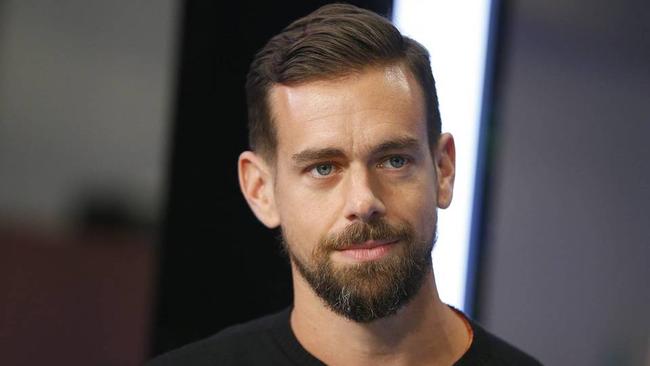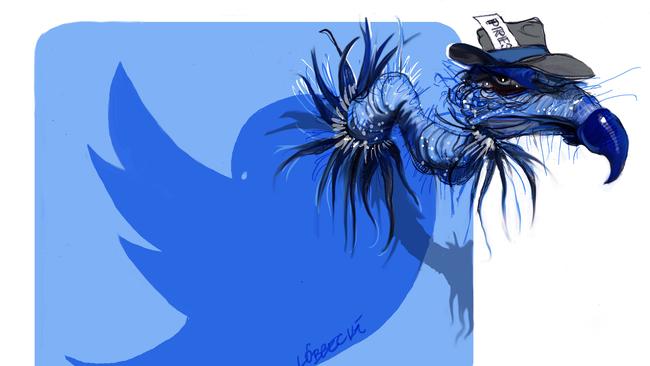#RIPTwitter: CEO Dorsey responds after backlash to algorithm reports
Twitter’s CEO has responded after suggestions it might rearrange the order of tweets based on their importance.

Twitter has faced a huge user backlash over suggestions it will rearrange the order of tweets based on importance rather than in a strict chronologically as early as next week.
The social network has been considering radical surgery in response to its stock price freefalling 55 per cent in a year, and user engagement figures that suggest a surprisingly small portion who join Twitter are active users.
Figures released by PewResearchCente last year showed that in the US, Twitter is well down the list of popular social networks. Only 20 per cent of the adult population use it, compared to Facebook (62 per cent), Pinterest (26 per cent), Instagram (24 per cent) and LinkedIn (22 per cent).
The latest reported idea is an algorithmic timeline which would see Twitter automatically rearrange tweets based on their perceived importance. It’s what Facebook does and adds to a perception that Twitter is trying to emulate Facebook and through that improve profitability.
It was an idea the US website BuzzFeed News explored in June last year.
“If they implement an algorithm properly, it could be the saviour of their platform, Forrest Research analyst and vice president Nate Elliott said at the time.
And it had the support of some users. “The squeals of reverse chronological purest power users are the cost of doing this necessary business,” said one online advocate of the change, @StartupL.Jackson. The concept underwent some field testing.
But the idea it is about to go live is facing hostile opposition, including from essential services such as weather forecasters. For example, the computer’s algorithm in its wisdom could decide that last month’s heavily retweeted forecast of a hurricane or cyclone warning was more important than today’s largely-ignored tweet of clear and sunny skies.
“This would be a HUGE problem for meteorologists. We have to have our tweets in a certain order. Hopefully they will consider this”, meteorologist Beau Dodson told BuzzFeed News.
Some are threatening to quit Twitter entirely if the change is implemented. “Honestly, @twitter. if you take away my timeline, I will never, ever use your service again,” said @emilysteers online.
Actor Rob Lowe was among those expressing outrage. “One of the great rewards of being an adult is deciding ON YOUR OWN who (and what) you should be interested in,” said Lowe in a tweet to 1.22 million followers.
In response to the weekend backlash, Twitter co-founder Jack Dorsey moved to dampen the speculation. “I *love* real-time. We love the live stream. It’s us. And we’re going to continue to refine it to make Twitter feel more, not less, live!,” Dorsey said in a tweet on his @jack account.
Hello Twitter! Regarding #RIPTwitter: I want you all to know we're always listening. We never planned to reorder timelines next week.
— Jack (@jack) February 6, 2016
Users have been mortified at the prospect of Twitter moving away from a raw, time-linked global chronology of people’s lives and world events to something more curated than “top tweets”.
At its Q2 earnings call last year, Dorsey was reported as saying: “You will see us continue to question our reverse chronological timeline, and all the work it takes to build one by finding and following accounts, through experiences like ‘while you were away’. We continue to show a questioning of our fundamentals in order to make the product easier and more accessible to more people.”
In December some users reported seeing their own timeline appear out-of-order during a Twitter in-house experiment. Screenshots are at this link.
If Twitter continued down this path there would be huge implications also for corporations and businesses who have sunk thousands of hours into understanding and leveraging the real-time Twitter environments and to build big followings of people who tune in online.
For the general users, Twitter offers immediacy: a way to share immediate thoughts with their followers. They wouldn’t want the social website to arbitrarily decide that something they said three months ago is more important than what they said today.
In politics, for example, it would have big implications for upcoming elections in Australia and the US? Would Twitter make a call as to which tweeted political statements were more important in the heat of a campaign?
One question: over time would users have to shell out to get certain tweets appearing closer to the top of their feed and in public feeds? Would it become more than just promoting popular tweets up a feed?

On the other hand, Twitter faces the problem that while it is a great social network for some: journalists, professionals, people in commerce and those espousing a cause, it can be a wasteland for others who haven’t got a particular message to push or an audience to link with.
Twitter is full of vacuous accounts where people simply retweet quotable quotes that have been doing the round since Adam, or link to old videos already linked to thousands of times. These accounts often get abandoned over time. Such users are better off chatting with friends in the warmer and friendlier environments offered by Facebook and other social media.
To help move itself forward, Twitter also has foreshadowed increasing the character limit of tweets from 140 to 10,000 (about 1000 words), which would allow it to carry detailed news. In October in the US it launched Moments, a separate tab with chosen tweets and news. It carries advertising.
While devout users live with some change, fiddling with live tweeting and the timeline looks a bridge too far, something those closely involved with Twitter believe would totally alter the character of the network.
For those closely engaged, Twitter is a huge part of their online DNA, professionally and personally. If any change impacts the network’s value, those who have invested thousands of hours curating their Twitter accounts and building large networks with their followers might throw their hands up in frustration, and call it a day.
Twitter itself is hosting a fiery conversation on the change — search using the hashtag #RIPTwitter.



